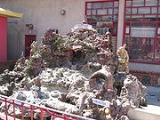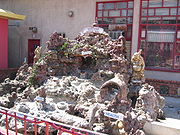
Wishing well
Encyclopedia

Europe
Europe is, by convention, one of the world's seven continents. Comprising the westernmost peninsula of Eurasia, Europe is generally 'divided' from Asia to its east by the watershed divides of the Ural and Caucasus Mountains, the Ural River, the Caspian and Black Seas, and the waterways connecting...
an folklore
Folklore
Folklore consists of legends, music, oral history, proverbs, jokes, popular beliefs, fairy tales and customs that are the traditions of a culture, subculture, or group. It is also the set of practices through which those expressive genres are shared. The study of folklore is sometimes called...
to describe wells
Water well
A water well is an excavation or structure created in the ground by digging, driving, boring or drilling to access groundwater in underground aquifers. The well water is drawn by an electric submersible pump, a trash pump, a vertical turbine pump, a handpump or a mechanical pump...
where it was thought that any spoken wish would be granted. The idea that a wish
Wish
A wish is a hope or desire for something. Fictionally, wishes can be used as plot devices. In folklore, opportunities for "making a wish" or for wishes to "come true" or "be granted" are themes that are sometimes used.-In literature:...
would be granted came from the idea that water
Water
Water is a chemical substance with the chemical formula H2O. A water molecule contains one oxygen and two hydrogen atoms connected by covalent bonds. Water is a liquid at ambient conditions, but it often co-exists on Earth with its solid state, ice, and gaseous state . Water also exists in a...
housed deities
Deity
A deity is a recognized preternatural or supernatural immortal being, who may be thought of as holy, divine, or sacred, held in high regard, and respected by believers....
or had been placed there as a gift from the gods, since water was a source of life
Life
Life is a characteristic that distinguishes objects that have signaling and self-sustaining processes from those that do not, either because such functions have ceased , or else because they lack such functions and are classified as inanimate...
and often a scarce commodity.
The Germanic and Celtic peoples considered springs and wells sacred places. Sometimes the places were marked with wooden statues possibly of the god associated with the pool. Germanic peoples were known to throw the armour and weapons of defeated enemies into bogs and other pools of water as offerings to their gods.
Water was seen to have healing
Healing
Physiological healing is the restoration of damaged living tissue, organs and biological system to normal function. It is the process by which the cells in the body regenerate and repair to reduce the size of a damaged or necrotic area....
powers and therefore wells became popular with many people drinking, bathing or just simply wishing over it. People believe that the guardians or dwellers of the well would grant them their wish if they paid a price. After uttering the wish, one would generally drop coin
Coin
A coin is a piece of hard material that is standardized in weight, is produced in large quantities in order to facilitate trade, and primarily can be used as a legal tender token for commerce in the designated country, region, or territory....
s in the well. That wish would then be granted by the guardian or dweller, based upon how the coin would land at the bottom of the well. Traditionally coins were made of copper or silver and had biocidal
Biocide
A biocide is a chemical substance or microorganism which can deter, render harmless, or exert a controlling effect on any harmful organism by chemical or biological means. Biocides are commonly used in medicine, agriculture, forestry, and industry...
properties which kept the water from going sour (bacteria
Bacteria
Bacteria are a large domain of prokaryotic microorganisms. Typically a few micrometres in length, bacteria have a wide range of shapes, ranging from spheres to rods and spirals...
produces various acidic compounds which affect the taste, notably Hydrogen sulfide
Hydrogen sulfide
Hydrogen sulfide is the chemical compound with the formula . It is a colorless, very poisonous, flammable gas with the characteristic foul odor of expired eggs perceptible at concentrations as low as 0.00047 parts per million...
). It was thus lucky to throw coins in the well.
The tradition of dropping pennies
Penny
A penny is a coin or a type of currency used in several English-speaking countries. It is often the smallest denomination within a currency system.-Etymology:...
in ponds and fountains stems from this. Coins would be placed there as gifts for the deity to show appreciation.
In November 2006 the "Fountain Money Mountain" reported that tourists throw just under 3 million pounds per year into wishing wells http://uk.news.yahoo.com/29112006/80-132/wishing-wells-contain-money-mountain.html.
This may be a left over from ancient mythology such as Mímir's Well
Mímir
Mímir or Mim is a figure in Norse mythology renowned for his knowledge and wisdom who is beheaded during the Æsir-Vanir War...
from Nordic myths, also known as the ¨Well of Wisdom¨, a Well that could grant you infinite wisdom provided you sacrificed something you held dear. Odin
Odin
Odin is a major god in Norse mythology and the ruler of Asgard. Homologous with the Anglo-Saxon "Wōden" and the Old High German "Wotan", the name is descended from Proto-Germanic "*Wodanaz" or "*Wōđanaz"....
was asked to sacrifice his right eye which he threw into the well to receive not only the wisdom of seeing the future but the understanding of why things must be. Mímir is the Nordic god of wisdom, and his well sits at the roots of Yggdrasil
Yggdrasil
In Norse mythology, Yggdrasil is an immense tree that is central in Norse cosmology. It was said to be the world tree around which the nine worlds existed...
, the World Tree which draws its water from the well.
A celebrated wishing well, the Upwey
Upwey, Dorset
Upwey is a village in south Dorset, England. The village is situated on the A354 road in the Wey valley and has been absorbed into the Weymouth built-up area and is four miles north of the town centre in the outer suburbs...
Wishing Well, is situated just north of Weymouth, England.

